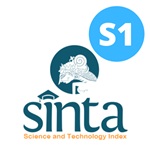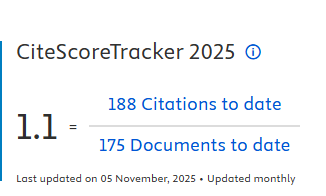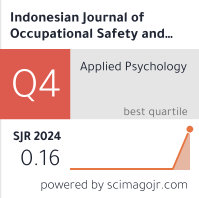Health and Safety Executive Work Related Stress Scale - Indonesian Version: Reliability and Convergent Validity

Downloads
Introduction: Existing measures of occupational stress often do not count an essential factor that determines the level of worker stress, which is psychosocial factors. The purpose of this study was to examine the psychometric features of an adaptation of the Health and Safety Executive-Work Related Stress Scale (HSE-WRSS), a measure that includes psychosocial factors to measure work stress. Methods: Cronbach alpha was used to determine reliability and convergent validity, by correlating it with other instruments, namely the Employee Well Being (EWB) scale and the neuroticism scale as part of the Big Five Inventory (BFI). Questionnaires were distributed online via Google Forms, and data processing was performed using JASP 12. Results: Data on a total of 210 out of 239 employees were processed for reliability testing and item analysis. Meanwhile, data for 37 employees were processed to be tested for a convergent validity test. The dependability of each dimension was between 0.67-0.82. Meanwhile, item analysis revealed that 33 items had a good Crit value with a correlation between item-total >0.30, whereas 2 items had a bad Crit value with a correlation between item-total 0.30. Correlation analysis revealed a positive and substantial relationship between the HSE-WRSS and the EWB scale, and a negative and significant relationship between the HSE-WRSS and neuroticism. Conclusion: In general, the results of this investigation demonstrate that the HSE-WRSS measurement is trustworthy and valid in the Indonesian version.
Beaton, D. et al. (2000) ‘Guidelines for the Process of Cross-Cultural Adaptation of Self-Report Measures', SPINE, 25(24), pp. 3186–3191.
Boyd, S., Kerr, R. and Murray, P. (2016) ‘Psychometric properties of the Irish Management Standards Indicator Tool', Occupational Medicine, 66(9), pp. 719–724.
Cillo, V. et al. (2019) ‘Blue-collar Workers, Career Success and Innovation in Manufacturing', Career Development International, 24(6), pp. 529–544.
Cousins, R. et al. (2004) ‘"Management Standards” and Work-related Stress in the UK: Practical Development', Work and Stress, 18(2), pp. 113–136.
Edwards, J. A. et al. (2008) ‘Psychometric analysis of the UK Health and Safety Executive's Management Standards work-related Stress Indicator Tool', Work and Stress, 22(2), pp. 96–107.
Gilboa, S. et al. (2013) ‘A Meta-Analysis of Work Demand Stressors and Job Performance: Examining Main and Moderating Effects', Personnel Psychology, 61(2) pp. 227–271.
Grasiaswaty, N. and Handayani, D. S. (2020) ‘The Role of Work Stress on Individual Work Performance: Study in Civil Servants', Jurnal Manajemen dan Pemasaran Jasa, 13(1), p. 111.
Guidi, S., Bagnara, S. and Fichera, G. P. (2012) ‘The HSE Indicator Tool, Psychological Distress and Work Ability', Occupational Medicine, 62(3), pp. 203–209.
Haynes, C. E. et al. (1999) ‘Measures of Perceived Work Characteristics for Health Services Research: Test of a Measurement Model and Normative Data', British Journal of Health Psychology, 4(3), pp. 257–275.
Herr, R. M. et al. (2015) ‘Three Job Stress Models and Their Relationship with Musculoskeletal Pain in Blue- and White-collar Workers', Journal of Psychosomatic Research, 79(5), pp. 340–347.
Hertz, R., Mattes, J. and Shook, A. (2020) ‘When Paid Work Invades the Family: Single Mothers in the COVID-19 Pandemic', Journal of Family Issues, 42(9), pp. 1–27.
Hofstede, G. and Hofstede, G. J. (2005) Culture and Organizations Software of the Mind. New York: McGraw-Hill.
Issom, F. L. and Makbulah, R. (2017) ‘Pengaruh Stres Situasi Kerja Terhadap Psychological Well-Being Pada Guru Honorer Madrasah Ibtidaiyah Di Kota Tangerang', Perspektif Ilmu Pendidikan, 31(1), pp. 61–67.
Jackson, P. R. et al. (1993) ‘New Measures of Job Control, Cognitive Demand, and Production Responsibility', Journal of Applied Psychology, 78(5), pp. 753–762.
Johanson, G. A. and Brooks, G. P. (2010) ‘Initial Scale Development: Sample Size for Pilot Studies', Educational and Psychological Measurement, 70(3), pp. 394–400.
Kerr, R., McHugh, M. and McCrory, M. (2009) ‘HSE Management Standards and stress-related work outcomes', Occupational Medicine, 59(8), pp. 574–579.
Killinger, S. L. et al. (2017) ‘Stress and Depression among Veterinary Medical Students', Journal of Veterinary Medical Education, 44(1), pp. 3–8.
Lambert, E. G., Hogan, N. L. and Barton, S. M. (2004) ‘The Nature of Work-Family Conflict among Correctional Staff: An Exploratory Examination', Criminal Justice Review, 29(1), pp. 145–172.
Mackay, C. J. et al. (2004) ‘"Management Standards” and Work-related Stress in the UK: Policy Background and Science', Work and Stress, 18(2), pp. 91–112.
Magnavita, N. (2012) ‘Validation of the Italian version of the HSE Indicator Tool', Occupational Medicine, 62(4), pp. 288–294.
Mansour, S. and Tremblay, D. G. (2016) ‘Work–Family Conflict/Family–Work Conflict, Job Stress, Burnout and Intention to Leave in the Hotel Industry in Quebec (Canada): Moderating Role of Need for Family Friendly Practices as "Resource Passageways”', International Journal of Human Resource Management, 29(16), pp. 2399–2430.
Marcatto, F. et al. (2014) ‘The HSE Management Standards Indicator Tool: Concurrent and Construct Validity', Occupational Medicine, 64(5), pp. 365–371..
Nabawi, R. (2019) ‘Pengaruh Lingkungan Kerja, Kepuasan Kerja dan Beban Kerja Terhadap Kinerja Pegawai', Maneggio: Jurnal Ilmiah Magister Manajemen, 2(2), pp. 170–183.
Primasari, D. N. et al. (2020) ‘Relationships between Personality and Work Environment Type and Work Stress Symptoms in Students of Dental Profession Education (Running Title: Personality, Work Environment Type and Work Stress Symptoms)', Systematic Reviews in Pharmacy, 11(3), pp. 912–917.
Ramdhani, N. (2012) ‘Adaptasi Bahasa dan Budaya Inventori Big Five', Jurnal Psikologi, 39(2), pp. 189–207.
Runtulalo, A. R., Areros, W. A. and Sambul, S. A. P. (2020) ‘Kompensasi Finansial dan Stres Kerja Terhadap Kepuasan Kerja Mitra Driver PT. Go-Jek Indonesia (Go-Ride).', Productivity, 1(4), pp. 312–316.
Schreurs, B. et al. (2010) ‘Job Insecurity and Employee Health: The Buffering Potential of Job Control and Job Self-Efficacy', Work and Stress, 24(1), pp. 56–72.
Sims, H. P., Szilagyi, A. D. and Keller, R. T. (1976) ‘The Measurements of Job Characteristics.', Academy of Management journal. Academy of Management, 19(2), pp. 195–212.
Taber, K. S. (2018) ‘The use of Cronbach's Alpha when Developing and Reporting Research Instruments in Science Education', Research in Science Education, 48(6), pp. 1273–1296.
Toderi, S. and Balducci, C. (2010) ‘HSE Management Standards Indicator Tool and Positive Work-related Outcomes', International Journal of Workplace Health Management, 3(2), pp. 362–369.
Vandiya, V. and Etikariena, A. (2018) ‘Stres Kerja dan Keterikatan Kerja pada Karyawan Swasta: Peran Mediasi Kesejahteraan di Tempat Kerja', Journal Psikogenesis, 6(1), pp. 19–34.
Wibowo, M.R.F., et al. (2017) ‘Reliability and Validity of the Indonesian Version of Big Five Inventory', UI Proceedings on Social Science and Humanities, 1(May).
Wiswanti, I. U. et al. (2020) ‘Pola Asuh dan Budaya: Studi Komparatif antara Masyarakat Urban dan Masyarakat Rural Indonesia', Jurnal Psikologi Sosial, 18(3), pp. 211–223.
Yani, M. D. and Dwiyanti, E. (2017) ‘Hubungan Kompensasi Finansial Dan Stres Kerja Dengan Kinerja Karyawan PT. Dok Dan Perkapalan Surabaya (Persero)', The Indonesian Journal of Occupational Safety and Health, 5(2), p. 163.
Zheng, X. et al. (2015) ‘Employee Well-being in Organizations : Theoretical Model, Scale Development , and Cross-Cultural Validation', Journal of Organizational Behavior, 36(5), pp. 621–644.
Copyright (c) 2022 The Indonesian Journal Of Occupational Safety and Health

This work is licensed under a Creative Commons Attribution-NonCommercial-ShareAlike 4.0 International License.

In order to be accepted and published by The Indonesian Journal of Occupational Safety and Health, Author(s) who submit an article should complete all the review process. The copyright of received articles assigned to the The Indonesian Journal of Occupational Safety and Health and Department of Safety and Health, Universitas Airlangga as publishers of the journal. The intended copyright includes the rights to publish articles in various forms (including reprints).
The Editorial Team of The Indonesian Journal Of Occupational Safety and Health and Department of Safety and Health strive to ensure that no errors occur in the articles that have been published, both data errors and statements in the article.
Users of this website will be licensed to use materials from this website following the Creative Commons Attribution-NonCommercial-ShareAlike 4.0 International License. No fees charged. Please use the materials accordingly.
------------------------------------------------------------------------------------------------------------------------------------------------------------------------------------------
Attribution ” You must give appropriate credit, provide a link to the license, and indicate if changes were made. You may do so in any reasonable manner, but not in any way that suggests the licensor endorses you or your use.
NonCommercial ” You may not use the material for commercial purposes.
ShareAlike ” If you remix, transform, or build upon the material, you must distribute your contributions under the same license as the original.







 How to Submit Articles in OJS
How to Submit Articles in OJS

























